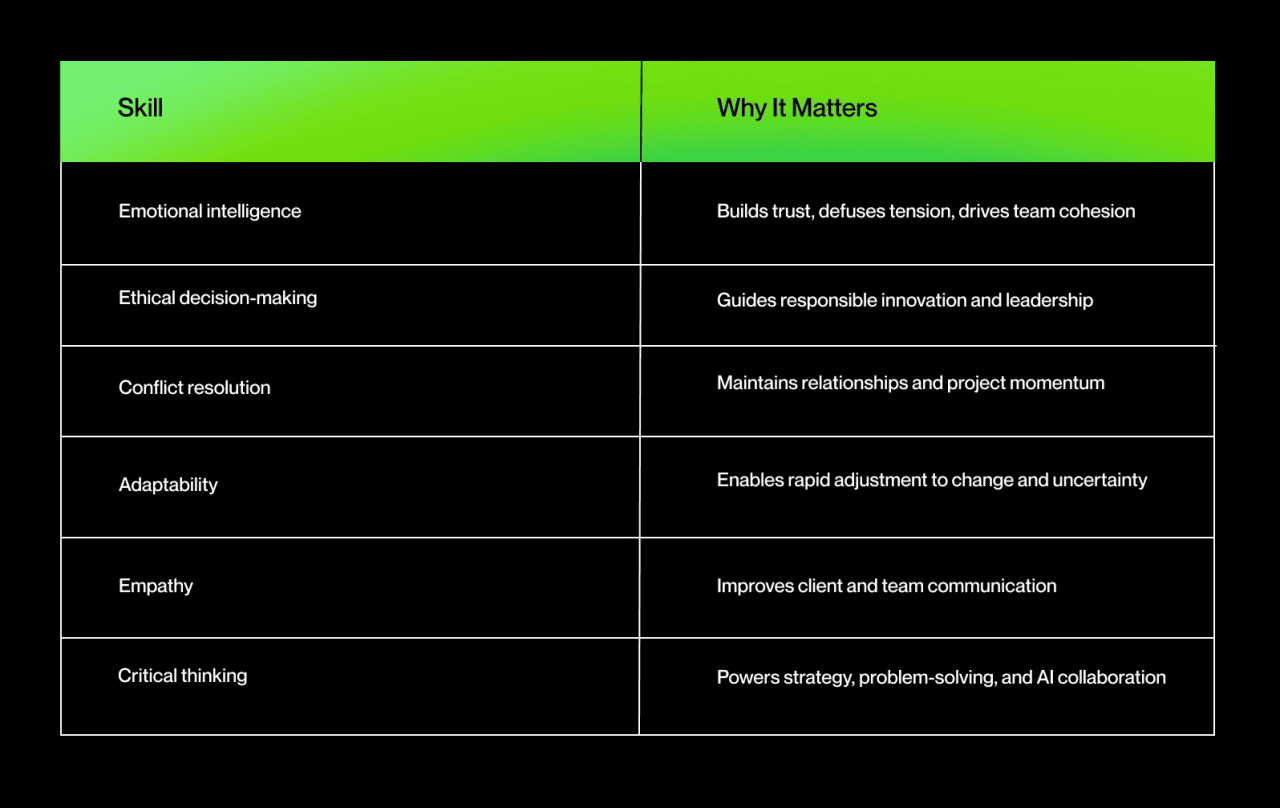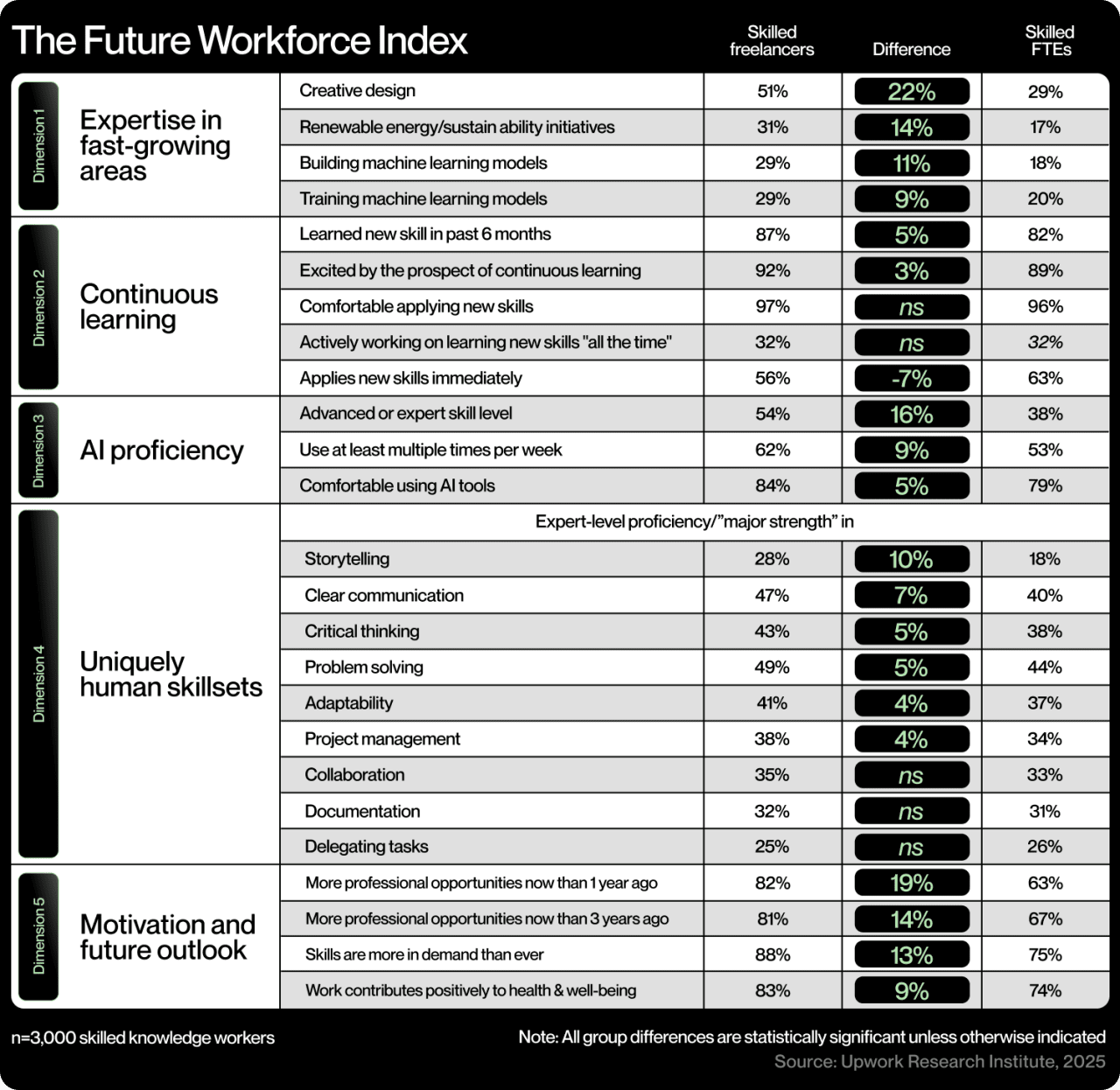Which skills are the most valuable in an AI-powered world of work?
Published 4:30 pm Wednesday, July 23, 2025
Which skills are the most valuable in an AI-powered world of work?
In today’s increasingly AI-driven world of work, success is becoming less frequently defined by technical or hard skills alone. Instead, the spotlight is shifting toward abilities like communication, adaptability, and critical thinking—so-called “soft skills.”
Soft skills are hard to automate, but are essential to long-term business success, notes Upwork, an online marketplace for hiring skilled freelancers. As such, they have been rebranded as “power skills”—the core competencies that drive collaboration, innovation, and leadership in an AI-driven economy.
Data from The Upwork Research Institute’s Future Workforce Index confirms what many already sense: Stakeholders who master power skills, especially in flexible and remote work environments, are better prepared for the future of work.
Trending
And the companies that prioritize these power skills? They’re the ones building truly AI-savvy, human-centered organizations.
AI is reshaping work, not replacing workers
When people think of the effect AI is having on the workforce, they often picture replacement: machines working faster and more cheaply than a person ever could. But the reality is more nuanced. Rather than displacing jobs outright, AI is fundamentally altering the way work is structured, executed, and valued. This transformation is elevating the importance of uniquely human capabilities.
As automation becomes more common, success depends less on the individual tasks a person might do, and more on how thoughtfully they approach their work, how well they adapt to change, and how they collaborate with team members.
Communication skills, problem-solving abilities, and emotional intelligence are no longer just “nice to have” skill sets—they’re what separate the high-performing professionals and teams from the average.
In fact, these capabilities are becoming the currency of the modern workplace. According to 2024 data from LinkedIn, communication—not coding or AI literacy—was the most in-demand skill for professionals to have. A separate LinkedIn survey also found that 69% of executives in the U.S. plan to prioritize “soft” skills when hiring professionals.
These data points aren’t a fluke; they’re a signal that we’re in a new world of work—one where being human is your greatest competitive edge.
The most valuable power skills that AI can’t automate
Trending

Upwork
Freelancers are outpacing full-time employees in power skills
One of the most revealing insights from the Future Workforce Index is this: Skilled freelancers are outperforming traditional employees across nearly every key power and interpersonal skill.
Among 3,000 skilled knowledge workers surveyed, freelancers consistently reported stronger capabilities in effective communication, critical thinking, adaptability, and problem-solving.

Upwork
While some of the gaps may appear small at first glance, they reflect a meaningful pattern: Freelancers are actively developing the skills that increasingly define success in a tech-augmented workplace.
How dynamic, trust-based work accelerates power skills
These numbers also show us that people with strong power skills thrive in situations that require flexibility, dynamic thinking, and a diversity of viewpoints. And comfort working in these environments is precisely what gives freelancers an advantage—and offers a blueprint for organizations looking to close skill gaps.
Freelancers regularly operate outside traditional hierarchies. They’re accustomed to:
- Switching contexts
- Managing multiple client relationships
- Solving open-ended problems
- Communicating value in different ways
- Working with different technologies
- Collaborating across time zones
On the whole, freelancers find the work requiring these skills to be enjoyable; 83% say their work positively contributes to their physical, mental, and emotional well-being. And 82% believe they have more work opportunities today than they did a year ago, compared to just 63% of full-time employees.
Reframing soft skills as business-critical power skills
Organizations that want to stay competitive need to audit how they nurture, assess, and reward power skills. Embedding the evaluation of these skills into hiring and onboarding processes, professional development curricula, and performance systems is no longer optional—it’s a strategic necessity.
For leaders, this starts with reshaping workplace dynamics to mirror the adaptability and autonomy freelancers experience. Such an approach might entail:
- Encouraging experimentation
- Promoting cross-functional collaboration
- Investing in peer mentoring and coaching programs
- Emphasizing power skills and people skills in workplace learning and upskilling
For professionals, the same principles apply. You can:
- Look for stretch assignments that challenge your communication or conflict-resolution abilities
- Join a feedback circle or mastermind group
- Read books on emotional intelligence, self-awareness, leadership skills, and decision-making
Power skills aren’t just career assets—they’re the foundation of resilience in an unpredictable world. And the companies and professionals that lead with empathy, adaptability, and creativity will be the ones shaping the future of work.
Upwork is not affiliated with and does not sponsor or endorse any of the tools or services discussed in this article. These tools and services are provided only as potential options, and each reader and company should take the time needed to adequately analyze and determine the tools or services that would best fit their specific needs and situation.
This story was produced by Upwork and reviewed and distributed by Stacker.
![]()





